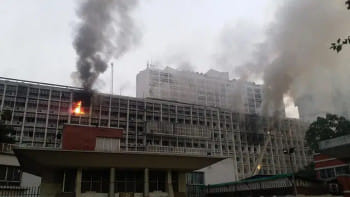Discovering Morocco

Sitting somewhere on the northern tip of Africa, Morocco is a country resplendent in glorious architecture and endowed with a distinct landscape. After a journey of about 16 hours through Dubai, my family and I reached Morocco's largest city Casablanca. Sea gulls were flying about and perching on the windowsill when we entered the hotel room finally.
The weather although chillier than that of Dhaka was still pleasant. It would rain from time to time. There was sometimes a communication problem since most locals speak in French or Arabic, but in higher-end places there were people fluent in English.
It seems the most common eatery in Casablanca would be the coffee shops, where people tend to relax and chat. Snails are smoked on the roadside, but that may not suit everyone's taste.

Our first destination was Marrakech, a desert, and particularly the Majorelle Garden. This garden boasts almost three hundred species of plants and a gallery featuring marvellous art. The small buildings are all painted in bright cobalt blue.
It was raining the day we went so we could not enjoy it much, but it was still a breathtaking sight. Since Yves Saint Laurent was one of the owners, his ashes are spread throughout the garden.
Jamaa el Fna, a UNESCO world heritage site, is essentially a traditional Moroccan market square. Usually, it is most bustling in the hours of the night. Even though we went there during the day there was still a lot to see. There was a line of horse-drawn carriages awaiting passengers. The smell may seem unpleasant to some, but for others the carriage ride is a new experience. There were small traditional stalls selling juice and water. There were even snake charmers playing their flutes and attracting audiences.

Next we went to the Saadian Tombs, once sealed and forgotten until 1917. It has grand structural designs, with old mosaics and calligraphy. It took us less than an hour to tour the whole area. Near the largest tombs are smaller ones in a natural setting. There were many varieties of flowers and fruit trees.
After we travelled back to Casablanca, we rested for a day. Then the last sight was the Hasan II Mosque. This mosque overlooks a part of the Atlantic Ocean. The rocky shore is inaccessible since there is a concrete wall.
For the final leg of journey we decided to visit Mall of Africa, which also happens to be one of the most famous malls of Africa. We arranged a taxi from our hotel to the mall. The journey itself was quite enjoyable since we got to get a good view of the Atlantic Ocean. Inside, there were all the famous French fashion brands.

The Casablanca Café, which was inspired by the classic movie Casablanca was started by the ex-US ambassador to Morocco. It is considered to be one of the famous landmarks of the city. Even though it was closed during our visit, we strolled across the street to take in the vibes. And that concluded much of our foray into a city of legends.
By Shahreen Islam
Photo: Collected


 For all latest news, follow The Daily Star's Google News channel.
For all latest news, follow The Daily Star's Google News channel. 



Comments